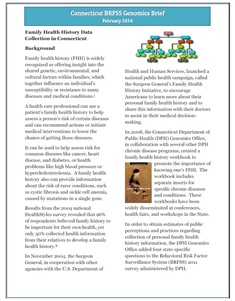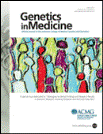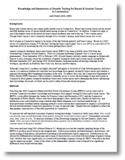Family Health History Resources
  | Workbook Factsheets: Family Health History Poster (PDF 624KB) |
 | The Connecticut Department of Public Health Genomics Office encourages the collection of Family Health History information, and sharing it with your health care provider. This new poster, supported by the Centers for Disease Control and Prevention, addresses a family history of cancer and where to look for more information. |
Cancer Genomics Best Practices for Connecticut Healthcare Providers
With the rise of personalized medicine, and rapid advances in genomic sequencing technology and diagnostic testing, healthcare providers and consumers have an increased need for accurate information about genetic testing, genomics, and heritable conditions. In response to these information needs, the Connecticut Department of Public Health Genomics Office has published a new version of Cancer Genomics Best Practices for Connecticut Healthcare Providers. In a concise format, the booklet provides information and resources for healthcare providers, patients, and patient family members about Hereditary Breast and Ovarian Cancer (HBOC) Syndrome and Lynch Syndrome (LS , formerly called Hereditary Non-Polyposis Colorectal Cancer Syndrome). Booklet contents include:
- Information sheets for providers;
- Information sheets for patients and their families ( Spanish versions available );
- Summaries of the current, evidence-based clinical practice guidelines on genetic susceptibility testing for HBOC syndrome and LS;
- State data on potential cases of hereditary cancer syndromes; and
- A list of cancer genetic counselors in Connecticut.
 |
Connecticut and three other states used survey data from the 2010 Behavioral Risk Factor Surveillance System to assess public concerns about the use of genetic information to determine insurance coverage and costs, and awareness of legal protections that exist. Only 16% of Connecticut respondents reported having heard about genetic nondiscrimination laws, such as the Genetic Information Nondiscrimination Act (GINA) passed at the federal level in 2008. However, the perceived importance of such types of laws was important, with 85% of respondents in the state rating them as very or somewhat important. Such results indicate the need for more public education to raise awareness of existing legal protections and those that may still be needed. Results were published online September 23, 2014 in the Journal of Genetic Counseling . |
| | |
 |
Connecticut BRFSS Genomics Brief: Family Health History Data Collection in Connecticut Connecticut Department of Public Health, Genomics Office. February, 2014. We used Connecticut data from the 2011 Behavioral Risk Factor Surveillance System to assess public perceptions and practices regarding family health history (FHH). Although 97% of respondents believed family history to be important for their own health, only 54% reported having collected their FHH. The percentages of those who had collected FHH differed among demographic subgroups. |
|
| |
 |
Connecticut and three other states used data from the 2009 Behavioral Risk Factor Surveillance System to assess awareness and use of direct-to-consumer personal genomic tests. Twenty-three percent of respondents in CT reported having heard or read about such tests, but less than 1% have ever had one. Factors associated with awareness were higher education, income greater than $75,000, and ages between 50 and 74, inclusive. Results were published in the journal Genetics in Medicine . |
|
| |
 |
Knowledge and Awareness of Genetic Testing for Breast and Ovarian Cancer in Connecticut (PDF 40KB) Connecticut Department of Public Health, Genomics Office. 2010. Following a 2007-2008 public awareness campaign in Connecticut about the availability of genetic testing for breast and ovarian cancer susceptibility, the Genomics Office used the 2008 BRFSS survey to assess the knowledge and awareness of men and women about such genetic testing. The results describe the factors influencing the respondents’ self-reported knowledge. |
 |
DPH Biobanks Brief (PDF 107KB) - Brief prepared by Drs. Carol Stone and Helen Swede, with contributions from Dr. Kati Kelley and Adrienne Manning of the DPH Laboratory. Universal Newborn Screening for Cystic Fibrosis in Connecticut (PDF 233KB) Connecticut Department of Public Health. 2006. Cystic Fibrosis New Born Screening Issue Brief. Hartford, CT. |
|
| |
| |
|
| |


